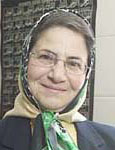Cornell scholar has role in drafting disputed Iraqi constitution
By Bill Steele

A Cornell scholar has been playing a small but - she believes - crucial role in the way the new Iraqi constitution, still incomplete, will deal with women's rights.
Nimat Hafez Barazangi, a research fellow in Feminist, Gender and Sexuality Studies, has been providing commentary on the sections of the draft constitution that bear on those issues. Some of her recommendations were incorporated into a recent draft. Whether or not they will make it into the final version remains to be seen. A new draft was presented to the Iraqi National Assembly Aug. 22, but it was not made public. Fundamental issues are still being disputed, and completion of the constitution remains bogged down.
"Our greatest fear is that [to meet the deadline] women's issues will be pushed aside," Barazangi said.
Barazangi, who was born in Syria, has for many years studied the role of women in the Qur'an and Muslim society. She is the author of "Woman's Identity and the Qur'an: A New Reading" (University Press of Florida, 2004), a book arguing that much of the repression of women in Muslim society is based on misinterpretations of the Qur'an. She also is co-editor of "Islamic Identity and the Struggle for Justice" (University Press of Florida, 1996). In January she was invited by consultants working with the United Nations Development Program, which has been monitoring the development of the Iraqi constitution, to serve as an adviser on women's issues.
Her work has been communicated primarily to a caucus of women serving on the Iraqi constitutional committee and in the Iraqi National Assembly, and her role has been to show the rationale for changes, based on the Qur'an, in the way the draft deals with women's rights.
There were, she says, five important issues in the first draft she reviewed:
Barazangi, after reviewing the draft in both English and Arabic versions, recommended specific changes and deletions. While she has made specific references to scripture, she said, the underlying rationale is that the Qur'an states quite simply that men and women are equal. About half of her recommendations, she has been told, have been followed in the most recent draft. The conflict over women's issues in the constitution, Barazangi explained, comes about because religious conservatives want the law of the land to reflect what they see as "Islamic law" regarding the status and behavior of women. But she argues that much of what they believe about the status of women grows out of misreadings of the Qur'an, and particularly from misinterpretations of Prophet Muhammad tradition. "Without an understanding of the source [the Qur'an], without going back to the source, nothing is going to change," she said.
Note: The g in Barazangi is soft. The first name is pronounced "NAHmat." |
Media Contact
Get Cornell news delivered right to your inbox.
Subscribe